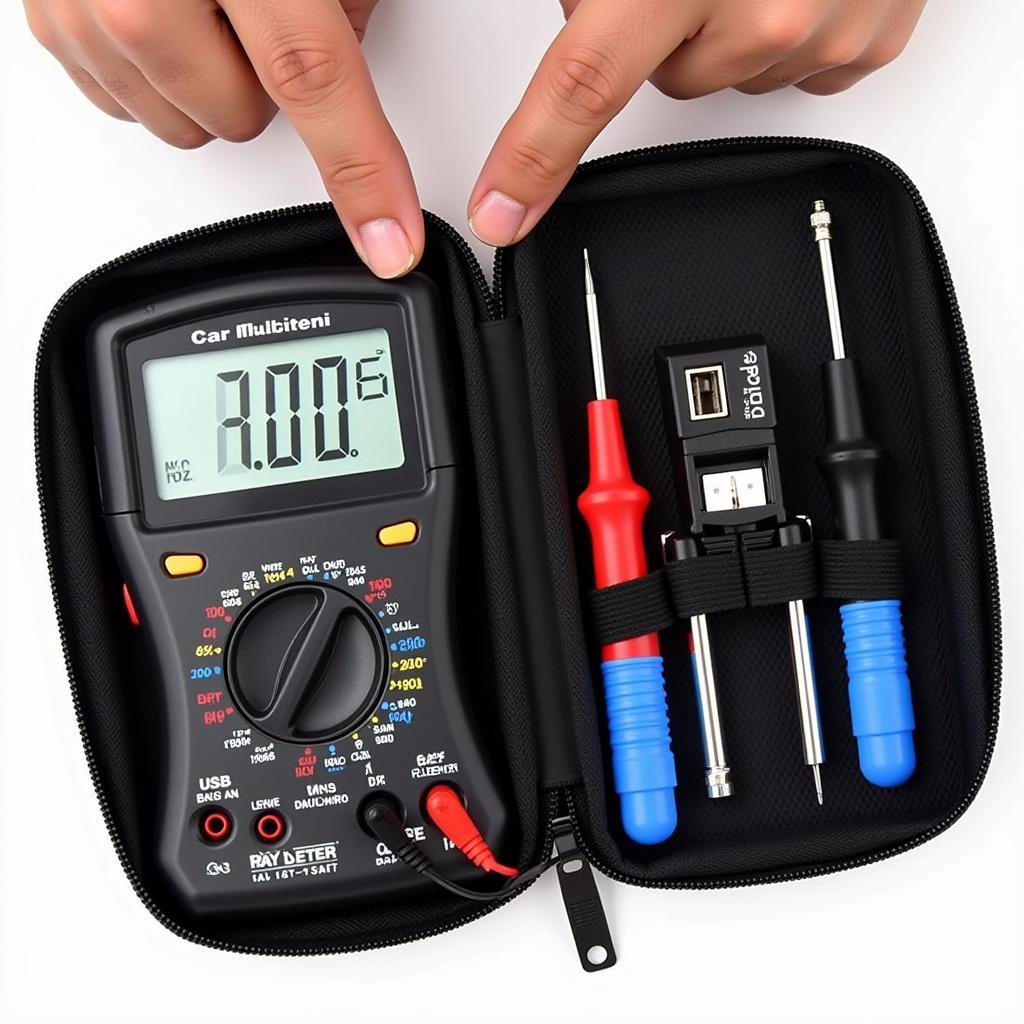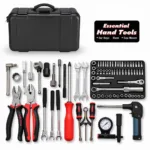A car USB charger is a lifesaver for keeping our devices powered on the go, but what happens when it stops working? Having the right tool kit for car USB charger diagnostics can save you time, money, and frustration. This article dives deep into the essential tools and knowledge you need to troubleshoot and fix common car USB charger issues. Let’s explore how to become your own car charging expert.
Understanding the Basics of Car USB Charger Functionality
Before diving into the tools, it’s important to understand how car USB chargers work. They draw power from your car’s electrical system, typically the 12V cigarette lighter socket or a dedicated USB port, and convert it to the 5V required by most USB devices. This conversion process is handled by internal circuitry within the charger. A faulty component in this circuit can lead to charging problems.
Knowing this basic functionality is crucial for effective troubleshooting. For instance, if your jumpstart car battery tool doesn’t seem to be charging effectively, the issue may not be with the tool itself but rather with the car’s electrical system. Understanding the flow of power will help you pinpoint the problem area.
Essential Tools for Car USB Charger Diagnostics
A well-equipped toolkit is your best ally when tackling car USB charger issues. Here’s a breakdown of the must-have tools:
- Multimeter: This versatile tool is essential for measuring voltage and current. It allows you to check if the charger is receiving the correct input voltage and outputting the proper 5V.
- USB Tester: A USB tester displays voltage, current, and sometimes even data transfer speeds. It helps you identify if the charger is delivering sufficient power to your device.
- Screwdrivers: A set of small screwdrivers is crucial for opening up the charger (if possible) to inspect internal components and connections.
- Test Load: A test load, like a resistor, can simulate the draw of a connected device, helping you determine if the charger can handle the load.
- Wiring Diagram: While not a tool per se, having a wiring diagram for your car’s electrical system can be invaluable for tracing power flow and identifying potential issues.
Common Car USB Charger Problems and Solutions
Now, let’s look at some common issues you might encounter:
- Charger Not Working at All: This could be due to a blown fuse in the car’s fuse box, a faulty charger, or a problem with the car’s 12V socket. Use the multimeter to check for power at the socket. If you need a new 4 in 1 emergency car safety tool, ensure its charger is compatible with your vehicle’s power system.
- Slow Charging: This can be caused by a low-output charger, a faulty cable, or a problem with the device being charged. Try a different cable and charger to isolate the issue.
- Intermittent Charging: Loose connections within the charger or a faulty cable can cause intermittent charging. Inspect the cable for damage and ensure the charger is securely plugged in. Consider purchasing an all in one emergency car tool for a more reliable option.
- Device Not Recognized: This often indicates a problem with the data pins of the USB port. Try a different cable or device to see if the issue persists.
John Doe, Senior Automotive Electrical Engineer, shares his insights:
“Investing in a proper diagnostic tool kit for car USB chargers is akin to having a first-aid kit for your car’s electronics. It empowers you to quickly identify and often resolve common charging issues, saving you valuable time and money.”
Jane Smith, Product Development Manager at a leading car accessory manufacturer, adds:
“Understanding the basics of car charging circuitry and utilizing a USB tester is key to distinguishing between a charger problem and a device problem, preventing unnecessary replacements.”
Conclusion
A well-equipped tool kit for car USB charger troubleshooting can empower you to diagnose and fix common charging problems. By understanding the basics of how these chargers work and using the right tools, you can save yourself time, money, and the frustration of a dead device. Remember to always check the basics first, like fuses and cables, before delving into more complex diagnostics. If you are in New Zealand and looking for a car escape tool nz, check that it includes a working charging mechanism. For those seeking a budget option, the https budgetedc.net products car-rescue-tool might be worth considering. Having the right tools and knowledge puts you in control of your mobile power.
FAQs
- What is the most important tool for car USB charger diagnostics? A multimeter is crucial for measuring voltage and current.
- How do I check if my car’s 12V socket is working? Use a multimeter to check for voltage at the socket.
- Why is my phone charging slowly in the car? This could be due to a low-output charger, a faulty cable, or a problem with the phone itself.
- What should I do if my car USB charger is not working at all? Check the car’s fuse box, the charger itself, and the 12V socket.
- Can I repair a car USB charger myself? If you have some technical skills and the right tools, you can attempt simple repairs like fixing loose connections.
- What is a USB tester used for? A USB tester displays voltage, current, and sometimes data transfer speeds, helping you identify power delivery issues.
- Where can I find a wiring diagram for my car’s electrical system? You can often find these diagrams in your car’s owner’s manual or online.
Need assistance? Contact us via WhatsApp: +1(641)206-8880, Email: [email protected] or visit us at 910 Cedar Lane, Chicago, IL 60605, USA. Our customer support team is available 24/7.


